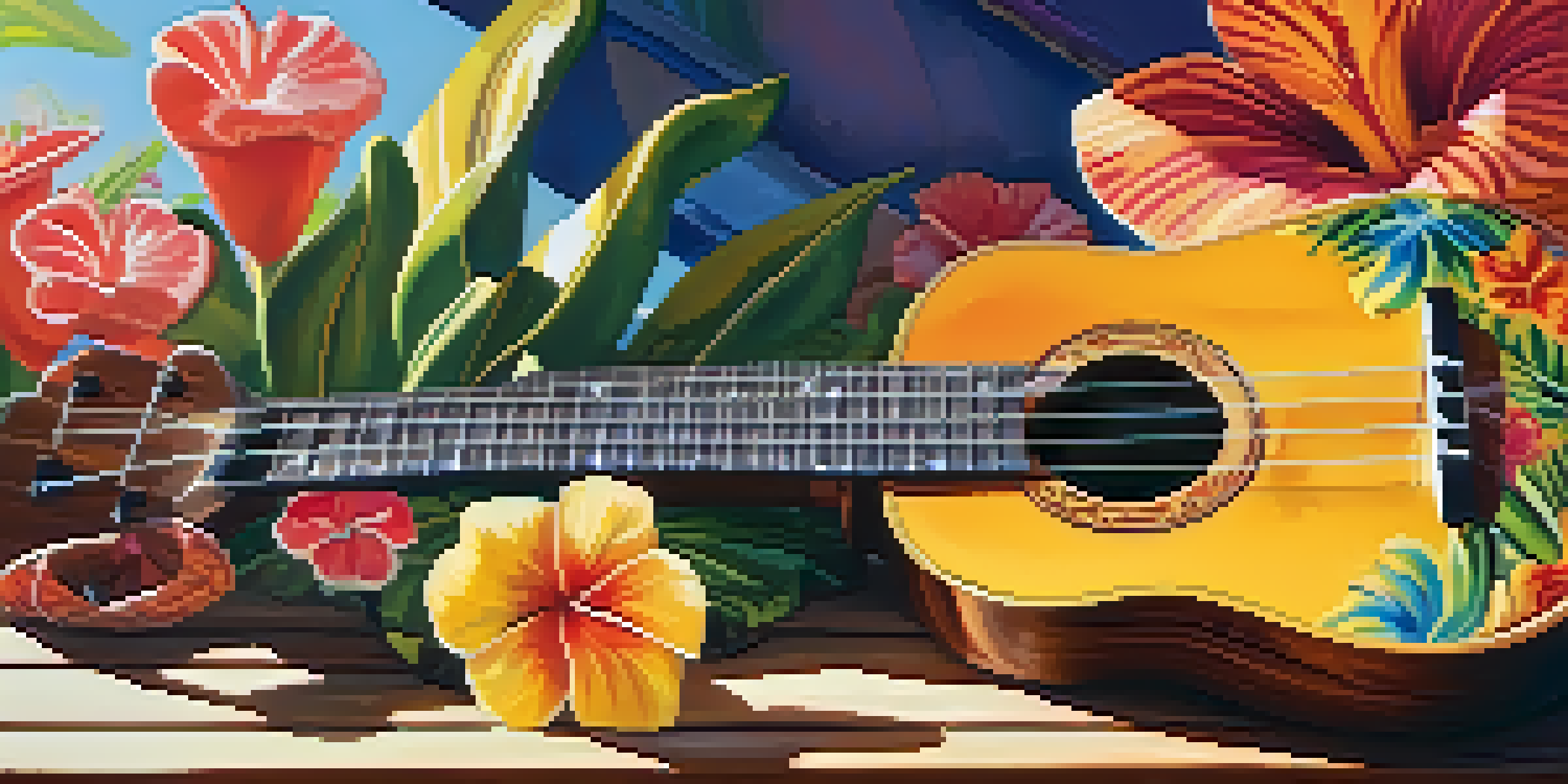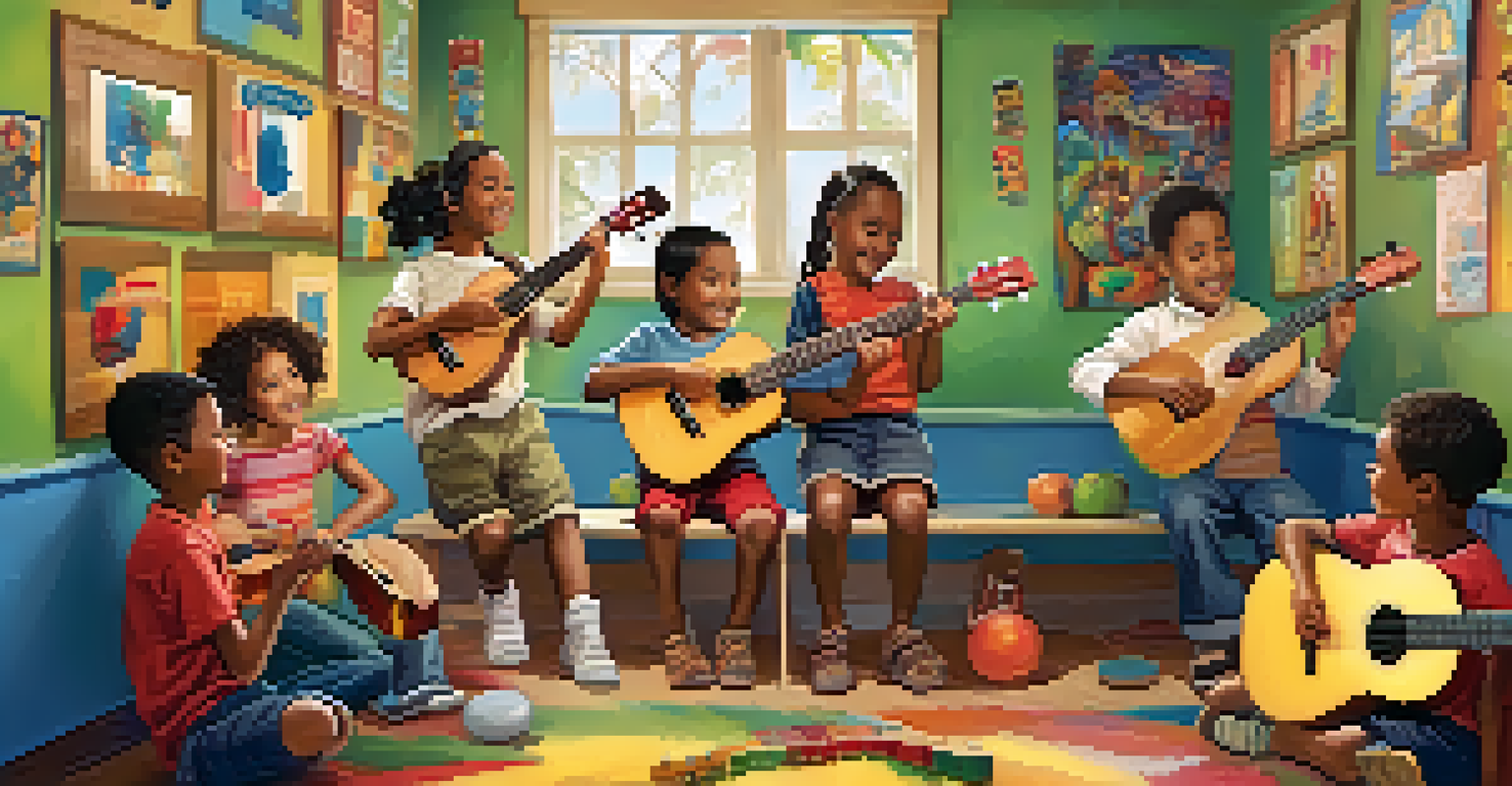The Ukulele's Impact on Folk Music Across Different Cultures

The Ukulele's Origins and Early Development
The ukulele originated in the late 19th century in Hawaii, where it was inspired by the Portuguese braguinha. This small, guitar-like instrument quickly captured the hearts of locals, becoming a staple in Hawaiian music. Its cheerful sound and portability made it an ideal choice for gatherings and celebrations, paving the way for its spread beyond the islands.
The ukulele is a small instrument with a big heart, capable of bringing people together through the joy of music.
As the ukulele gained popularity, it began to travel to the mainland United States, particularly during the early 20th century. It found a home in American folk and popular music, where its lively tone contributed to the burgeoning sounds of jazz and blues. This transition marked the beginning of the ukulele's role as a versatile instrument in various musical genres.
As we explore the ukulele's influence, it's essential to recognize how its unique sound has resonated with different cultures, each adapting it to their musical styles. This adaptability has made the ukulele not just an instrument, but a bridge connecting diverse musical traditions.
Cultural Adaptations of the Ukulele
Different cultures have embraced the ukulele, giving it unique twists that reflect their musical heritage. For instance, in Japan, the ukulele became popularized after World War II and was integrated into traditional folk songs, creating a distinct fusion of sounds. This blending highlights how the instrument can harmonize with local musical elements, transcending its origins.

In addition to Japan, the ukulele has made its way into the musical landscapes of countries like the Philippines and New Zealand. Filipino musicians often incorporate the ukulele into their folk songs, enriching their vibrant musical scene. Meanwhile, in New Zealand, the ukulele has become emblematic of Māori music, showcasing how cultures can adapt and innovate using the same instrument.
Ukulele's Global Cultural Impact
The ukulele has adapted to various cultures, enriching musical traditions worldwide and serving as a bridge between diverse musical heritages.
These adaptations not only showcase the ukulele's versatility but also emphasize the importance of cultural exchange in music. The instrument serves as a reminder of how shared experiences can lead to beautiful new creations, bridging gaps between different musical traditions.
The Ukulele's Role in Modern Folk Music
Today, the ukulele has found a renewed place in modern folk music, appealing to a new generation of musicians and listeners. Its light, cheerful sound makes it a favorite for singer-songwriters, who often use it to create intimate, heartfelt performances. This resurgence is a testament to the ukulele's ability to adapt to changing musical landscapes while still maintaining its folk roots.
Music is the universal language of mankind, and the ukulele speaks it beautifully.
Moreover, the ukulele has become an accessible instrument for beginners, encouraging more people to explore music-making. Schools and community programs have increasingly introduced the ukulele, making it a popular choice for music education. This accessibility has helped foster a love for folk music and inspired a new wave of artists to incorporate the ukulele into their work.
As we listen to contemporary folk music, we can hear the ukulele's influence resonating in various melodies and rhythms. Its presence in modern music highlights the ongoing evolution of the folk genre, showcasing how traditional instruments can thrive alongside new musical trends.
The Ukulele in Global Folk Festivals
Folk festivals around the world have embraced the ukulele, celebrating its place in diverse musical traditions. Events like the Ukulele Festival of Great Britain attract thousands of enthusiasts, featuring performances from artists of all backgrounds. This gathering not only showcases the ukulele's versatility but also fosters a sense of community among musicians and fans alike.
In addition to dedicated ukulele festivals, the instrument often takes center stage at larger folk music festivals. Events like the Newport Folk Festival and the Kerrville Folk Festival highlight artists who incorporate the ukulele into their performances, showcasing how it enriches the folk music experience. These festivals serve as a platform for cultural exchange, where audiences can discover new sounds and stories.
Resurgence in Modern Folk Music
The ukulele has gained renewed popularity in contemporary folk music, appealing to new generations of musicians and listeners alike.
The presence of the ukulele in these festivals reflects its growing importance in the global folk music scene. It brings together people from different cultures, united by a shared love for music and the joy that the ukulele brings.
Influence of the Ukulele on Songwriting
The ukulele has had a significant impact on songwriting, inspiring countless artists to craft memorable tunes. Its distinct sound encourages creativity, often resulting in catchy melodies that resonate with listeners. Many songwriters find that the ukulele's cheerful tone sparks joy and encourages a playful approach to their compositions.
For example, artists like Israel Kamakawiwoʻole have harnessed the ukulele's charm to create timeless songs that touch the heart. His rendition of 'Somewhere Over the Rainbow' showcases how the instrument can evoke deep emotions while remaining upbeat and inviting. This ability to blend sentimentality with joy is a hallmark of ukulele-driven songwriting.
As more musicians gravitate towards the ukulele, we can expect to see its influence continue to shape the songwriting landscape. The instrument's inviting nature encourages artists to explore new themes and ideas, fostering a spirit of collaboration and innovation in folk music.
The Ukulele as a Tool for Cultural Preservation
The ukulele plays an essential role in preserving cultural heritage through music. Many indigenous communities use the instrument to pass down traditional songs and stories, ensuring that their unique histories are not forgotten. This practice highlights the ukulele's significance as a vessel for cultural expression and continuity.
In recent years, initiatives have emerged to promote the ukulele within cultural contexts, encouraging younger generations to connect with their roots. Educational programs often incorporate traditional songs played on the ukulele, fostering a sense of pride and identity among participants. This blending of old and new helps to keep cultural traditions alive and relevant.
Cultural Preservation Through Music
The ukulele plays a vital role in preserving cultural heritage by helping communities pass down traditional songs and stories to younger generations.
By embracing the ukulele in cultural preservation efforts, communities can celebrate their heritage while also adapting to modern influences. The instrument serves as a bridge between generations, reminding us of the importance of honoring our past while looking towards the future.
The Future of the Ukulele in Folk Music
As we look to the future, the ukulele's place in folk music seems more promising than ever. With its growing popularity and adaptability, the instrument is likely to continue evolving alongside emerging musical trends. This evolution ensures that the ukulele will remain a relevant and cherished part of the folk music landscape.
The rise of social media platforms has also contributed to the ukulele's resurgence, allowing musicians from around the world to share their creations. This global connectivity fosters collaboration and innovation, giving rise to new genres and styles that incorporate the ukulele. As artists experiment with this instrument, we can expect exciting developments in folk music.

Ultimately, the ukulele's impact on folk music across cultures is a testament to its universal appeal. It not only brings joy and connection but also serves as a reminder of the power of music to unite people from different backgrounds, paving the way for a vibrant future in folk traditions.